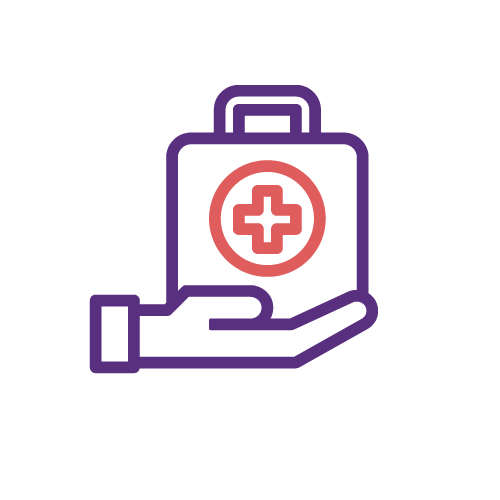Day 5 - May 16: Understanding Care is There

Prevention is Key
Staying on top of your health means more than just seeing a health care provider when you’re sick. Routine care, a healthy diet, physical activity, quality sleep, finding the right primary care provider, and getting ready for health care visits are key steps to keeping yourself in the best health possible.
The Power of Routine Care
Routine care includes recurring checkups, screenings, and vaccinations. These appointments can help catch health issues early or even prevent them before they start. Think of your body like a car; regular maintenance can keep it running smoothly and prevent bigger problems down the road. Routine care can:
Recommended Routine Screenings
Your health is unique, and so are your screening needs. The infographic below gives general guidelines as recommended by the United States Preventative Services Task Force, but the best way to know exactly what screenings are right for you is to talk to your health care provider, who can consider personal health history, family history, and current health status. Schedule an appointment today to take charge of your health and ensure you get the care you need at every stage of life.
 To learn about what screenings are recommended for women across the lifespan, access our Health Screening Recommendations fact sheet.
To learn about what screenings are recommended for women across the lifespan, access our Health Screening Recommendations fact sheet.
Finding Your Health Care Partner: Choosing a Primary Care Provider
Your primary care provider is your go-to for most health concerns, from flu-like symptoms to managing chronic conditions. Finding a healthcare provider, you trust and feel comfortable talking to is crucial. Here’s some tips to help you pick the right fit for you:
- Insurance Coverage: If you have health insurance, start by checking which doctors are covered by your plan. If you don’t have insurance, resources and health centers may be available to help you find care for little or no cost. Explore options and find a health center near you through the Health Resources and Services Administration.
- Health Needs: Consider any specific health needs you have. Some primary care providers have specialized expertise, for example, in women’s health or heart health.
- Recommendations: Ask friends, family members, or other health care providers for suggestions of providers they like, feel comfortable with, or have had positive experiences with.
- Meet-and-Greet: Many doctors offer a first visit to get to know them. Use this time to see whether you feel comfortable with their communication and approach.

If You Can’t See a Doctor
Sometimes, seeing a doctor isn’t an option for various reasons, such as location, cost, or appointment availability. Many other healthcare providers can offer services to meet your needs. Nurse practitioners and physician assistants are trained providers who can provide routine care, prescribe medications, and manage the most common health concerns. They work as part of your health care team, ensuring you receive the care you need.
Making the Most of Your Visit
Explore our fact sheet is designed to empower you with the knowledge and confidence you need to navigate your health care appointments and ensure your voice is heard. Don’t wait to take charge of your health journey; download the Your Health, Your Way fact sheet today to make the most of your next visit.
Taking an active role in your health care is one of the best things you can do for your long-term health. Routine care, finding the right primary care provider, and being prepared for visits put you in the driver’s seat. Remember, you’re the most important member of your health care team.
Resources to Learn More
- 5 Healthy Aging Tips for Women - U.S. Food & Drug Administration’s Office of Women’s Health
- Adult and Child/Adolescent Immunization Schedule by Age - Centers for Disease Control and Prevention
- Fibromyalgia: Diagnosis, Treatment, and Steps to Take - NIH National Institute of Arthritis and Musculoskeletal and Skin Diseases
- Five Ways to Get the Most Out of Your Doctor's Visit - NIH National Institute on Aging
- How to Choose a Doctor You Can Talk To - NIH National Institute on Aging
- How to Prepare for a Doctor's Appointment - NIH National Institute on Aging
- Lupus: Diagnosis, Treatment, and Steps to Take - NIH National Institute of Arthritis and Musculoskeletal and Skin Diseases
- MyHealthfinder - HHS Office of Disease Prevention and Health Promotion
- Talking With Your Doctor Worksheets - NIH National Institute on Aging





